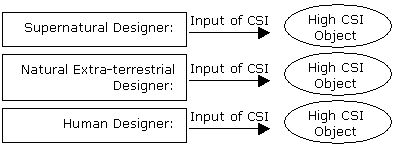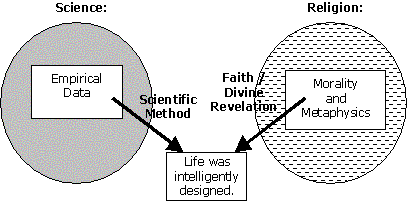
FAQ: What is the Identity of the Designer?
The Long Answer: The scientific theory of intelligent design cannot name the identity of the designer, but only detects the past occurrence of intelligent design in the natural world. Intelligent design theory cannot name the designer because it works off the assumption that all designers in general create a certain type of information when they act. While we can detect that type of information in the natural world to infer intelligent design, finding that type of information does not give us any more information about the designer other than that the designer intelligently designed the object in question. Consider the following diagram: 
In this diagram, many types of intelligent agents could produce identical objects with high levels of CSI. Intelligent design theory can only find the object containing high levels of CSI and works backwards. While it can detect that the object was designed, it cannot discriminate what kind of designer designed the object, nor determine any specific properties about the designer, other than that it was an intelligent agent. All intelligent design theory can infer is that the object was designed. Intelligent design, as a scientific theory cannot identify the identity of the designer. Intelligent design proponent and biochemist Michael Behe explains how we don't have to know the designer to be able to recognize intelligent design: […] The conclusion that something was designed can be made quite independently of knowledge of the designer. As a matter of procedure, the design must first be apprehended before there can be any further question about the designer. The inference to design can be held with all the firmness that is possible in this world, without knowing anything about the designer." (Michael Behe, Darwin's Black Box, page 196-197). A scientific theory makes claims about the natural world based upon observations of the natural world and employing empirically-based mechanisms to explain those observations. A scientific theory cannot make claims which go beyond things that are possible to observe and cannot employ mechanisms which in principle could not be empirically-justified. Every theory therefore has empirical bounds and limitations. In other words, a theory can only explain those things which are possible to observe and explain using empirically-based mechanisms and the tools and technology available to us. Theories simply are not capable of explaining things beyond their empirical bounds and limitations. A theory also cannot help the bounds that it has--those bounds are imposed upon it by the laws of physics, the nature of reality, and the ability of humans to innovate and empirically observe the natural world. The fact that a theory has bounds does not make it any less scientific, or any less potent within its empirical bounds; it just means that a theory is constrained by what it is possible to observe in the natural world. For example, it would be foolish to ask the quantum physicist, "How does quantum tunneling explain how chlorophyll makes plants green?" or to ask the botanist, "What does our current understanding of mechanisms of photosynthesis tell us about fundamental particles that compose atoms?" Such questions extend beyond the empirical bounds and limitations of a theory and the tools used by the scientists in each respective field. Intelligent design is a scientific theory that also has a particular scope. Intelligent design cannot be faulted if its scope is limited; nor can it be ignored or dismissed on answers it provides to questions within its scope simply because it fails to address a question we would prefer to lie within its scope, but doesn't. Asking intelligent design to answer questions outside of its scope is to make a category fallacy. It is like asking a bachelor to whom he is married, when a bachelor is by definition unmarried. To fault intelligent design theory for not explaining enough, when its empirically-based scope limits what it can explain, is to fall trap to the same mistake. But what happens when questions are posed to the intelligent design theorist such as, "Who is the designer?" This is surely an interesting and important question. But for the scientist, the question must be asked, "What is the explanatory scope of intelligent design theory?" or more specifically, "How much can intelligent design theory explain based upon observations which are possible from the natural world?" Intelligent design bases its inferences on observations finding the type of complexity produced by intelligent agents when they operate. As noted, when it finds this sort of complexity, it cannot infer more than the mere conclusion that life was designed. Not identifying the nature of the designer or the methods used is not a cop-out nor does it stem from an unwillingness to be honest about motivations. It results solely from the pure empirical limitations of scientific investigation: 
Thus, scientifically, one only can state that life was designed by an unidentified intelligence. Many people may believe that the identity of the designer is the God of the Bible, however these are religious claims, and presently outside the scope of scientific inquiry. |
Other Links: Other FAQs: Philosophical / Religious / Theological FAQs: |